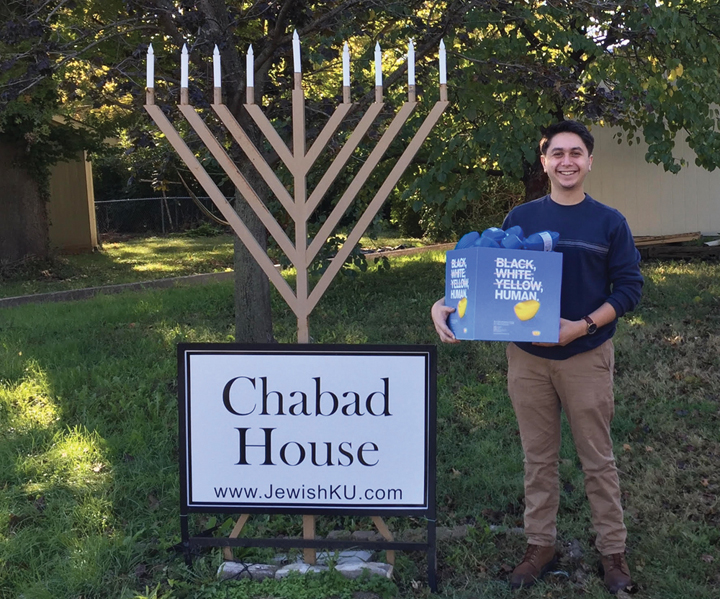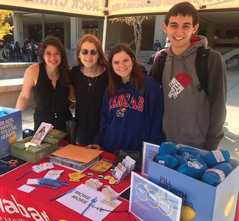
It’s not unusual for KU Chabad to look for ways to change the world one step at a time. Its latest Acts of Random Kindness (ARK) campaign is one such example.
Late last year, after multiple shootings in which three young people were killed outside a bar in downtown Lawrence, KU Chabad began encouraging random acts of kindness. Rabbi Zalman Tiechtel, who is co-director of the Rohr Chabad Center for Jewish Life at the University of Kansas in Lawrence, said KU students and others in the area “were seeking to create a movement encouraging kindness.”
This led them to start the Good Card Campaign, through which cards were left in various public places with written instructions to people who would find them to “commit a random act of kindness.”
“This went on for a couple of months,” Rabbi Tiechtel said. “When it died down, (we wondered) what could we do to build on the strength of the movement and generate more positivity and more light. That’s when we learned of the ARK campaign and brought it to Kansas.”
That was in August of this year. Through the campaign, small blue containers that resemble an ark (boat) and function like a piggy bank are given to people free with the request that they fill them with coins, periodically empty them and then give the money to charities of their choice.
“Thank G-d, it took off with tremendous demands,” Rabbi Tiechtel said. “So many people are seeking ways to express that desire to make a difference.”
More than 2,000 of the arks have been given away, mostly in Lawrence, he said.
“In response to the recent, horrific attack in Pittsburgh (at Tree of Life*Or L’Simcha Congregation in Pittsburgh, Pennsylvania, on Oct. 27, at which 11 people were shot and killed and six others were injured), we took this campaign to the next level to reach even more people,” he said. “We’ve had a number of events in the past two weeks where we’ve distributed tens of these arks.”
The campaign has no time limit, and its power lies in its simplicity, Rabbi Tiechtel said. One of its unique aspects is that people can take action as soon as they take possession of the arks.
“With these, they pick up the ark and all they have to do is pick up a coin,” he said.
A number of donors have given money to the Good Card or ARK campaigns or both, including Howard Jacobson, an activist and volunteer in Kansas City’s Jewish community, and the late Professor Neil Salkind, who taught at KU and who died recently, and who “was a pillar of the Jewish community in Lawrence,” Rabbi Tiechtel said.
“We’re seeking more donors because we’re running very low,” he said. “We want to make a call to action if we can. (The arks are) like a piggy bank for serving others rather than serving self.”
Daniel Shafton is the campaign’s director. He’s a senior at KU and got involved in the campaign in August of this year.
“This effort in particular spoke to me,” Shafton said. “It was so real, it was so raw and it was so genuine. It’s a way to instill philanthropy in an entire city. … Our goal is just to get as much attention and traction on it as possible, not just at the university but also in the city and the state. I think it’s most important for college kids because this is the last time we can instill this in students’ minds.
“We want you to take your own change and your own time and give it to who you think needs it most,” he said. “… It’s important for businesses to get involved too, to reward their employees and make it part of their culture.”
The arks come with an attached card with a written message: “Even the smallest gesture has a ripple effect. We all want to do something that makes a difference but we often don’t know where to start. That’s why we are partnering with the ARK campaign … to give you an easy way to do something good for someone in need.”
We all want to change the world, Rabbi Tiechtel said, “but we have to start small.”
“The best way to do it is by taking one action,” he said. “The ARK campaign helps transform people into doers and givers instead of just being concerned about the state of the world. It’s a very powerful thing.”




